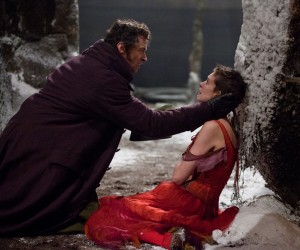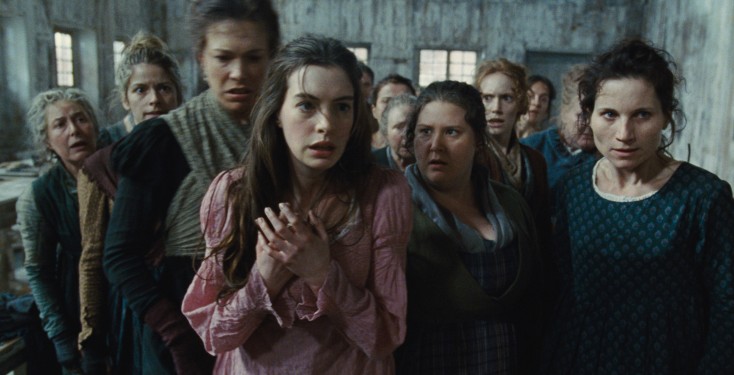
Jean Valjean (HUGH JACKMAN) embraces a very ill Fantine (ANNE HATHAWAY) in “Les Misérables” ©Universal Studios. CR: Laurie Sparham.
By JAMES DAWSON
Front Row Features Film Critic
“Les Misérables” is the kind of bloated, cornball and sappy spectacle that makes people say they hate movie musicals. Most of the melodies (by Claude-Michel Shönberg) are unmemorable, most of the lyrics (by Alain Boublil and Jean-Marc Natel, translated from French to English by Herbert Kretzmer) are witlessly unsubtle and the most interesting singer is the one who technically has the least capable voice.
While the elaborate sets and overall look are undeniably impressive, nearly everything else about this 99 percent sung-through film version of the long-running stage success seems overbaked. It’s hard not to come away from this two-and-a-half hour ordeal wishing director Tom Hooper (“The King’s Speech”) had dropped the songs entirely and shot a straight adaptation of the Victor Hugo novel instead.
The main players in this 19th-century tale of redemption, revolution and love at first sight are Jean Valjean (the painfully earnest Hugh Jackman), a parole-breaker imprisoned 19 years for stealing a loaf of bread; the doggedly persistent Inspector Javert (an oddly cast but intriguing Russell Crowe), who is determined to recapture Valjean; and factory worker turned prostitute Fantine (a howlingly hammy Anne Hathaway), who leaves her young daughter Cosette in Valjean’s care.
Hathaway’s ridiculously melodramatic delivery of the musical’s signature number “I Dreamed a Dream,” filmed in a single intimately unforgiving take, is excruciatingly oversung. Her strained facial contortions resemble the tearfully crazed flashlight close-ups in “The Blair Witch Project,” playing more like overripe parody than emotional sincerity.
Jackman is competent but unexciting as Valjean, never fully convincing in either a filthy fugitive’s rags with a shaved head or a prosperous gentleman’s finery and a fop hat. His prisoner 24601 is introduced as one of hundreds of convicts tugging ropes attached to a listing ship in a storm. Those virtual slaves perform what may be the musical’s best and certainly its simplest tune, the grimly fatalistic “Work Song” (“look down, look down, you’re standing in your grave”).
Crowe unexpectedly provides the movie’s most enjoyable performance, perhaps because he comes off as the cast’s least overrehearsed, comfortable and slickly professional singer (even though he formerly fronted a rock band in real life). He’s also the best actor here, portraying a conflicted ideologue whose character is a sadistic bully, an obsequious public servant and a genuinely tragic figure.
The movie’s biggest production number, a cartoonishly comic “Master of the House” by a scenery-chewing Sacha Baron Cohen and Helena Bonham Carter, is so outrageously inconsistent with the rest of the mawkish proceedings that it seems cannibalized from a Sondheim-lite revue. The weakest moments are between the older Cosette (Amanda Seyfried) and the instantly smitten Marius (Eddie Redmayne), a slumming swell who sympathizes with the soon-to-be uprising working classes. Their dazzled declarations of young love are saccharinely silly.
The musical’s bland lyrics too often are “talk-sung” and tiresomely repetitive. The agonizingly redundant chorus of the supposed-to-be anthemic “Red and Black,” sung with passionate fervor by Marius and company, is repeated so often that submitting to the guillotine would be a relief. Things go beyond absurd when a Cockney-accented kid who seems to have dropped in from an amateur staging of “Oliver Twist” appears in the role of a Parisian street urchin.
When it finally arrives, the story’s desperately weepy ending (spoiler alert ahead for those unfamiliar with the 150-year-old novel or the 32-year-old musical) is so flagrantly overwrought it may as well have featured the smiling spirits of Valjean, Fantine and Javert strolling off arm in arm to the afterlife.
Good looking but cheesier than a wheel of Roquefort, “Les Mis” deserves a miss.





